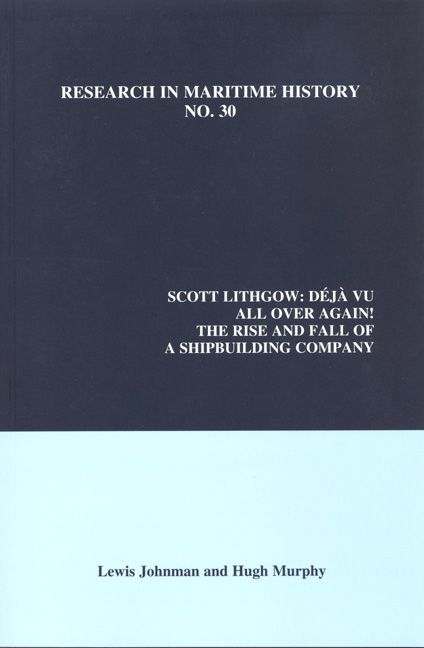Book contents
- Frontmatter
- Contents
- Acknowledgement
- Introduction
- Chapter 1 Scotts of Greenock, 1711-1945
- Chapter 2 Russell and Company to Lithgows Limited, 1874-1945
- Chapter 3 Scotts Shipbuilding and Engineering, 1945-1965
- Chapter 4 Lithgows Limited, 1945-1965
- Chapter 5 The Long March to Merger, 1965-1970
- Chapter 6 The Road to Nationalisation, 1970-1977
- Chapter 7 Nationalisation to Privatisation, 1977-1984
- Chapter 8 Déjà vu All over Again: Trafalgar House, 1984-1988
- Chapter 9 Conclusion
- Appendix
- Bibliography
Chapter 7 - Nationalisation to Privatisation, 1977-1984
- Frontmatter
- Contents
- Acknowledgement
- Introduction
- Chapter 1 Scotts of Greenock, 1711-1945
- Chapter 2 Russell and Company to Lithgows Limited, 1874-1945
- Chapter 3 Scotts Shipbuilding and Engineering, 1945-1965
- Chapter 4 Lithgows Limited, 1945-1965
- Chapter 5 The Long March to Merger, 1965-1970
- Chapter 6 The Road to Nationalisation, 1970-1977
- Chapter 7 Nationalisation to Privatisation, 1977-1984
- Chapter 8 Déjà vu All over Again: Trafalgar House, 1984-1988
- Chapter 9 Conclusion
- Appendix
- Bibliography
Summary
By vesting day on 1 July 1977, in addition to Scotts’ engine works, Cartsburn, Cartsdyke and Bowling shipyards, and Lithgows’ Glen, Kingston and Ferguson Brothers Newark yards, Scott Lithgow's ship repair arm and Scott Lithgow Drydocks were also nationalised. This was because they formed integral parts of Scott Lithgow's operations, as did Caledonia Joinery, Caledonia Fabrications, and two other recently-formed small companies, Newark Ferguson Limited and Cowal Engineering. The temporarily London-based state corporation, British Shipbuilders (BS), was now responsible for all the major shipbuilders and a sizeable share of ship repairers and marine engineering firms in the country.
During the seemingly interminable march to nationalisation it was decided as a matter of policy not to over-centralise the functions of BS in its formative stage. Accordingly, all the larger firms had a degree of autonomy “in line with the general policy on decentralisation and free competition,“ which in any case was enshrined in Section 5 of the Act. From the outset, a number of chief executives of individual firms, including Ross Belch, had places on the BS board, as in the name of industrial democracy did a trade unionist, Ken Griffin. Belch's view was that there was “no great enthusiasm on either side for a rigid form of industrial democracy.” On pay, the Chancellor of the Exchequer, Denis Healey, had informed the BS chairman, Admiral Griffin, that he would expect that BS (overall responsibility for industrial relations was given to it in the Act) would adhere strictly to government pay policy with the exception of self-financing productivity schemes and possible pension improvements. Given the parlous state of the industry, centralisation in BS had surely to increase because little foresight was required to see that inherited losses could seriously undermine any attempt at profitability. Commercial prudence also dictated that BS would wish to investigate the basis of financial forecasts, particularly the extent of loss provisions in its constituent firms. Furthermore, different rates of pay in each firm were all but guaranteed to be a source of considerable friction, particularly with Scott Lithgow employees over the long-running sore of pay parity with their Upper Clyde counterparts. Indeed, it was difficult to contemplate how Scott Lithgow could continue for any length of time to justify a pay gap in a nationalised setting.
- Type
- Chapter
- Information
- Scott LithgowDéjà Vu all over again! The Rise and Fall of a Shipbuilding Company, pp. 257 - 304Publisher: Liverpool University PressPrint publication year: 2005



